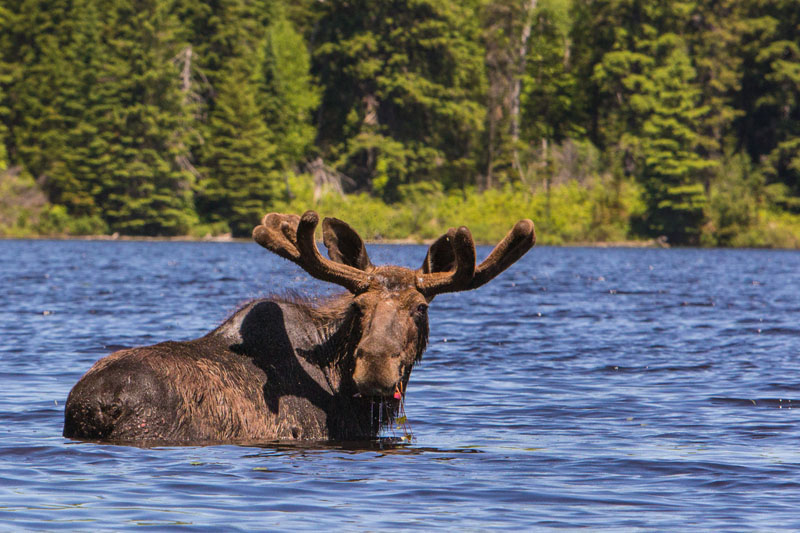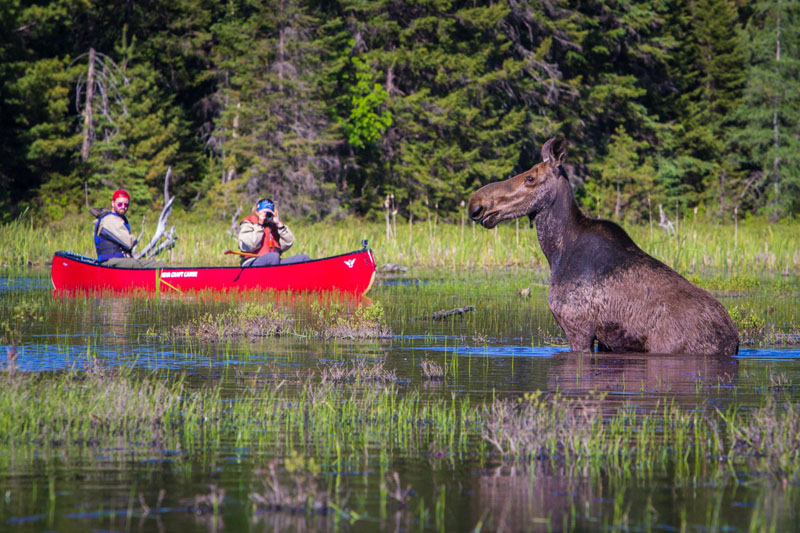Summary
We were lucky enough to see 18 moose on our wildlife safari in Algonquin Park with Voyageur Quest. Whenever we think of wildlife in Canada, we picture one of our great Canadian symbols, the moose. Just like hockey, the loonie, or the maple leaf, people identify moose with our country.
Moose Safari In Algonquin Park

The blanket of morning mist still lay on the lake as we paddled silently through the still waters of Algonquin Park, Ontario. We had left camp at dawn on our photography safari in search of one of Canada’s largest mammals – the Algonquin moose.
Algonquin Park is renowned for being one of the best places in the world to spot moose. In early mornings and late afternoons during late spring, you’ll see plenty standing on the shores of lakes and swampy marshlands, gnawing on twigs and lily pads.
If you know where to look, you can encounter bull moose, cows, and calves standing in shallow waters, attempting to escape the swarm of black flies and mosquitoes that trail them in the dense forest.
While it’s possible to spot Algonquin moose standing by the roadside as you drive along Highway 60, seeing them in their natural habitat within the expansive 7650 km² park is an unforgettable experience.
Moose Photography Safari
Dave and I joined acclaimed wildlife photographer Rob Stimpson on his annual moose photography canoe trip to his favourite spot in Algonquin Park. Offered through Voyageur Quest Adventures, this secret lake in Algonquin Park is one of the premier locations in Canada for moose sightings, and we encountered many.
The staff at Voyageur Quest are experts in locating moose, and Rob leads photo enthusiasts and outdoor lovers to his special spot somewhere within the Provincial Park. Throughout our three-day adventure, we didn’t see another paddler or hint of civilization, but we certainly saw plenty of moose—18, to be exact.
Algonquin Park Cabins
Our journey began at the Voyageur Quest Log Cabin, where we met our guides and fellow adventurers. Built in 1995, the cabin embodies the classic chalet one would envision for a night in the Canadian wilderness.
Standing two stories high, it is surrounded by trees and situated on a tranquil lake. A small fire blazed in the massive stone fireplace, reaching to the top of the loft ceiling, while a spacious screened-in porch filled with Muskoka and other lounge chairs invited relaxation and bird songs from outside.
Moose Safari Lunch in Style
After a brief lunch at the long maple wood table, we embarked on an afternoon paddle on the lake to practice silent strokes and emphasize moose spotting etiquette. Since moose are easily startled, it’s essential to proceed without making a splash or sound. Moreover, we ensured that our cameras were silenced to maintain a stealthy approach.
If we needed pointers on paddling techniques, today was the day to refine them.
Moose Spotting Etiquette
Our paddle was pleasant, and we soon returned to the cabin to learn more about the local wildlife. Renowned naturalist Robin Tapley has traveled the world discussing wildlife.
A Talk with a Naturalist
We were fortunate to have Robin give us a talk about the birds and wildlife we might encounter in the bush. He is a walking encyclopedia of nature, effortlessly identifying the names of dozens of birds as they chirped around us.
We explored moose behavior and discussed the various animals inhabiting the area. Algonquin Park is teeming with wildlife, and we could easily encounter wolves, foxes, beavers, otters, or even bears. Armed with our newfound outdoor knowledge, we settled in for a restful night, knowing an early wake-up awaited us for another big day.
Algonquin Park Canoe Trip
On day two of our moose safari, we set out for our tent campsite within the borders of Algonquin Park. There was much paddling ahead, and we faced two portages along our route. Portages are trails connecting two bodies of water.
After paddling to the end of one lake, we had to disembark from our canoes, retrieve all our gear, and navigate through the woods to reach the next body of water.
The Portage
Dave carried our canoe on his head while I managed our packs and gear. Fortunately, our portages were only a maximum of 350 meters; however, carrying heavy gear through uneven trails can feel like a long trek.
Our group was equipped with food and cooking gear, necessitating a few trips. Dave and I had previously conquered the park’s longest portage, which spans 5 km; thus, we were grateful for our relatively short journeys today.
Bug Jackets an Ontario Savior
On the water, we managed to evade the early season black flies, but once on land, these pests became intense. Black flies are small yet formidable; their bites can lead to itchy welts across your face and neck. Thankfully, our new bug jackets—provided by the original bug shirt—were indispensable during our portages.
Having tried other jackets before, these proved to be the Cadillac of bug jackets. Their canvasback and chest protect against bites, while the breathable mesh face mask and sleeves help prevent overheating. Without them, the portages would have been overwhelmingly uncomfortable.
Camping in Algonquin Park
Upon reaching camp, our tents were already set up, and the cooking and communal area were ready for us. Camping within the wilderness of Algonquin Park offers a magical experience. Tents are placed along the shores of secluded lakes, with no one else in sight. With Voyageur Quest, all supplies were provided, and our guides prepared gourmet meals.
Moose Encounters in Algonquin Park
After a brief stop at camp for a quick snack, we hopped back into our canoes for our first moose encounter. Almost immediately, we spotted a male moose swimming nearby.
We held back to allow him space, but as we approached, he swiftly retreated to the safety of the woods—though we managed to capture a few photos!
We saw additional moose along our route, but our most extraordinary encounter occurred in a marshy area where Rob had previously observed eight moose at once. Confident in our luck, we were treated to a series of breathtaking encounters.
One highlight was when our group split up, and my canoe positioned on one side, while Dave and Rob were on the other. We ensured the moose had an easy escape route back to the woods or between us in the water. To our amazement, she decided to swim out between our boats and rest on an island, taking in the surroundings before swimming away.
I was struck by how quickly a moose can move. While I had heard that moose are fast in water, this particular female was remarkably swift, and we were privileged to witness it all.
Continuing our search for moose, we encountered another mother and her calf, as well as additional males and females lounging by the lake’s banks. By paddling quietly and keeping downwind, they remained unaware of our presence, allowing them to continue their routine.
We were elated with our encounters and cherished the experience of paddling while observing these majestic creatures. Even if one does not spot a moose in Algonquin Park, the experience is undoubtedly rewarding. When the waters are still and calm, the reflections and natural beauty are unparalleled.
Early Morning Paddle Algonquin Park
Birds soar through the sky, beavers construct their dams, and chipmunks nestle in the brush. If you sit quietly, you may hear an entire community of wildlife waking around you.
For additional information regarding moose safaris and Algonquin Park tours, visit the Voyageur Quest Website.
To view the award-winning wildlife photographs taken by Rob Stimpson, visit his photography website.




